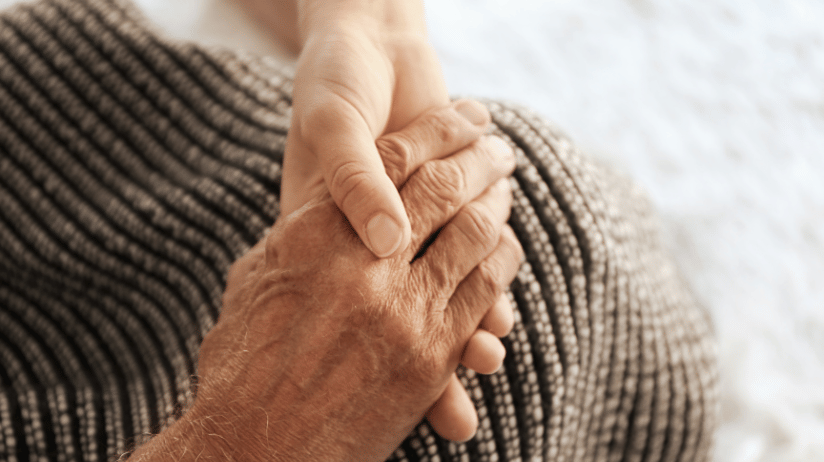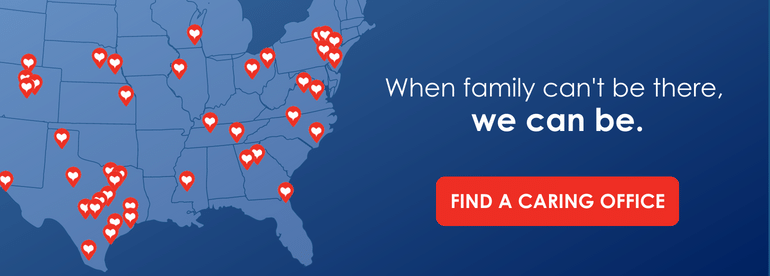Caring for a loved one at the end of their life can be emotionally challenging. This type of care requires a deep commitment to preserving your loved one's dignity and maintaining their privacy as they pass. Family caregivers can help provide this type of support and care to their loved ones as they pass. Learn more about strategies to maintain privacy and dignity for a dying loved one.
Designate a Private Space
If possible, designate a private and comfortable space for the older adult. This can be their bedroom or a dedicated area within a larger space. By setting aside a separate space for care, you can help respect privacy and provide a comfortable environment.
As needed, set boundaries for this space. For example, establish a protocol for family and friends to follow when entering the individual's private space. A simple "knock and wait" policy fosters a culture of respect for their privacy.
If it is not possible to use a separate room, try to create privacy within a shared space. Consider using privacy screens or curtains to provide a physical barrier when necessary. This can be especially important during personal care activities or when the individual desires moments of solitude.
Speak Directly to the Senior
At the end of a senior’s life, they may lose cognitive function. Seniors may not be able to understand the changes of aging or their own impending passing. Seniors may also no longer be responsive. However, family members and caregivers should never speak about the individual as if they aren’t in the room.
When in the room with your loved one, introduce yourself, address them directly, and explain what you will do. You may not know whether a senior can hear you or understand you, but that doesn’t matter. Out of respect, you should speak directly to them when you are in the same room. By communicating with your loved one in this manner, you help maintain their dignity and identity as an individual.
RELATED CONTENT: How to Help Seniors Age with Dignity
Use Respectful Communication
You should also remember to use respectful communication when talking to your loved one or someone else in the room. For example, avoid jargon or slang that your loved one would not understand. Likewise, don’t speak down to your loved one. This type of communication can patronize a senior.
If your loved one is still communicative, initiate a compassionate and respectful conversation to understand their preferences. Pay attention to verbal and non-verbal cues. If they have any questions, answer them to the best of your ability. Maintain respectful communication with others in the room even if your loved one is not able to respond.
Never joke or make light of a senior’s condition — even if you are not in the same room as them. Instead, you should always display empathy and patience.
Maintain Modesty in Personal Care
Seniors may not be able to do anything for themselves as they actively pass. So, they may need someone to bathe them, change their diapers, or groom them. When providing personal care, keep their body covered except for the section of the body you are cleaning or caring for.
For example, if you are washing their chest, only reveal their chest. Then, cover the chest if you are going to clean another area of the body. You can use a towel, blanket, or sheet to help you provide privacy to a senior and be discreet as you provide care.
You should also ask family members to leave the room when you provide personal care to your loved one. This helps maintain privacy for your loved one as they receive the care they need.
Secure Personal Belongings
You can also respect your loved one's privacy by storing personal belongings properly. This includes documents, valuables, and sentimental items. Avoid unnecessary handling of these items, unless your loved one says otherwise.
This is no time for family members to start going through your loved one's things. Instead, spend as much time as possible with your loved one, ensuring that their care team helps them achieve the best quality of life.
RELATED CONTENT: How to Care for a Dying Loved One
Use Discretion
Healthcare providers may need to discuss important personal matters with you about care, including medical treatment and life expectancy. You may need to provide other information, such as frequency of bowel movements. As you discuss this type of information, try to remain discreet. No one would want these intimate details shared publicly.
Use your best judgement when deciding what information to pass along to the family, and what information should remain between you and the care team.
Respect Religion
If a senior was religious throughout their lifetime, they may have certain preferences related to their death. For example, a senior who is Muslim may want to pass away while facing Mecca. A senior who is Mormon may want to be buried in specific religious clothing.
Coordinate with family and close friends to ensure that religious needs are addressed. This is a great way to honor your loved one and promote their dignity at the end of life.
Caring for a dying loved one can be difficult. However, as you care for them with compassion and help maintain their privacy and dignity, you can help make their transition as smooth as possible. If you need assistance during this time, reach out to your local Caring team. Our professional caregivers can take care of the physical needs of your loved one so you can be with your loved one and family.


